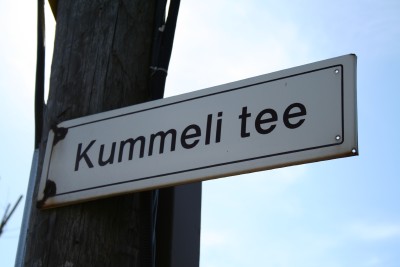Some fine examples of
homonüümihuumor (homonym humour) can be found in the Tallinn suburb of Mähe. Kummeli (camomile) tee and its neighbour Jasmiini (jasmine) tee could be showing the way to a tea house, but in this case
tee means road. You also have the choice of Nurmenuku (cowslip, primula) or Vabarna (
vaarika – raspberry) tee nearby.
Other examples of Estonian words which share the same spelling, pronunciation, or both, yet have different meanings are:
puur (cage or drill),
tint (smelt – a fish, or ink),
reis (trip/journey or thigh) and
aas (meadow or a loop of string/rope).
A specific type of homonym is a homograph (
homograaf), whose meaning is distinguished by different pronunciations:
palk (salary or log if palatalised) and
tall (a lamb/kid or stall/stable if palatalised).
Crossing the language barrier also makes for some interesting homonyms, (obviously similar in form, not sound), such as
pink = bench in Estonian,
male = chess,
hell = delicate/sensitive,
part = duck,
hunt = wolf,
hall = grey,
sale = slender,
seep = soap,
last = load,
all = down/below,
keep = cape;
hull = crazy,
keel = tongue, language;
leer = rite of confirmation in the Lutheran church,
side = a connection,
silt = sign/billboard;
lust = joy, delight, enthusiasm;
purse = eruption, outburst, gush;
rant = edge, rim, border;
arm = a scar, as well as love.
Hell hall hunt, mu arm – gentle, grey wolf, my love...
Two English-Estonian homonyms almost identical in pronunciation in both languages are
vein = wine in Estonian and
vend = brother.
And returning to the road sign where we began,
road (plural of
roog) in Estonian means prepared food / culinary dishes and so a tourist favourite in most restaurant menus are the appetizers –
EELROAD. This literally means “introductory dishes” and not an avenue for slithery creatures; that would be
Angerja tee. As for the suburb of Mähe, its name is most likely derived from the word
mäe, meaning “of the hill” and not from the other meaning of
mähe = diaper! This other meaning would rarely cross people’s minds these days, since the new word for disposable, paper diapers is “
pampers”. Unless you’re a purist. Our baby wears
mähkmed, even if they say Pampers...

